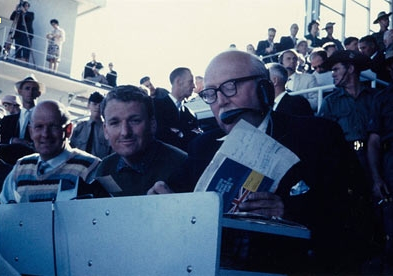People
Vernon Morgan - amateur Olympian, professional sports editor
Monday 2 July 2012
 Vernon Morgan - Olympic athlete and Reuters sports editor for more than 30 years - always said he drew much inspiration from the “Chariots of Fire” Paris Olympics of 1924. Although he did not compete in those Games, in 1981 he was invited to be a consultant on the film. He had competed in the 3000 metres steeplechase at the Amsterdam Olympics in 1928.
Vernon Morgan - Olympic athlete and Reuters sports editor for more than 30 years - always said he drew much inspiration from the “Chariots of Fire” Paris Olympics of 1924. Although he did not compete in those Games, in 1981 he was invited to be a consultant on the film. He had competed in the 3000 metres steeplechase at the Amsterdam Olympics in 1928.
Morgan, right in the photo, was devoted to sports and the Olympic ideals. He travelled the world reporting every Winter and Summer Olympics from 1936 to 1968. Retiring after the Mexico Olympics of 1968, he became one of very few to be awarded the distinguished Olympic Order of Merit. The award, established in 1905 by Baron Pierre de Coubertin, founder of the modern Games, is given to “an individual with a general reputation for merit and integrity, who has been active and efficient in the service of amateur sport, and has contributed substantially to the development of the Olympic movement”.
Born in north west England in 1904, Morgan was a good example of the type of trainee journalist favoured by Reuters between the wars. At Charterhouse School he won several public schools athletics championships before going up to Oxford in 1923 where he won blues in athletics, cross-country and football. He also became an accomplished hockey player. In 1925 he even played one game of football for Manchester United against the Corinthian Casuals. One of his proudest achievements was to run the mile in four minutes 16-2/5 seconds during a tour by an Achilles Club team in Durban, South Africa. It stood as the South African All-Comers record for more than 20 years.
Amusingly to modern eyes, C E D Peters, secretary to the Oxford University Appointments Committee, still had reservations about Morgan. Clearly unaware that Sir Roderick Jones, head of Reuters, had started life in humble circumstances near Manchester, Peters ended his letter of recommendation in 1931 with a caveat ‘…There are some traces of the North-Country, but I believe he would prove reliable and successful in business.’
Morgan was appointed Reuters sports editor in 1933. It was in this capacity that he captained the Reuters team sent to report the infamous Berlin Olympic Games of 1936. Knowing the important worldwide influence of Reuters, Joseph Goebbels, Hitler’s Reich minister for propaganda, made sure that Morgan and his team had the best press seats from which to report the expected success of German athletes. This turned sour when black American track and field athlete Jesse Owens won four gold medals, becoming the most outstandingly successful athlete at the games.
Hitler’s fury with the American team had begun at the opening ceremony. As they paraded before him in the podium, Morgan reported that not only did the Americans not salute (which has been expected as it is not in accordance with American Regulations to dip Flag) but certain members of the team failed to doff their headgear...
The outbreak of war in 1939 meant that sports reporting came to a virtual halt. Morgan was sent to report the Russo-Finnish War, first from Copenhagen and later from Helsinki. This was not his finest hour for, as with politics and general news, he was not at his most comfortable covering war. A severe bout of pneumonia left him unfit for active service. So he returned to London and worked in various editorial posts. He also served, along with both general manager Christopher Chancellor and chief editor Walton (Tony) Cole, in the Fleet Street battalion of the Home Guard.
During his long career, Morgan filed reports from 60 countries. Even in his late fifties he was fanatical about physical fitness. During the 1962 British Empire and Commonwealth Games in Perth, Western Australia, he roused his much younger staff for early morning swims in the Indian Ocean before embarking on another 18-hour day. He played golf until well into his eighties.
Morgan was a passionate devotee of the British Olympic Association and of the amateur code with which he had grown up. He deplored the rise of professionalism. At an IOC event in Varna, Bulgaria - his last formal appearance - he made a passionate speech condemning the increasing state sponsorship of athletes. Just weeks before his death in 1992 - and while watching television coverage of the World Athletics Championships - he was still to be found consulting the dictionary over the precise meaning of the word “amateur”. ■
- « Previous
- Next »
- 471 of 579